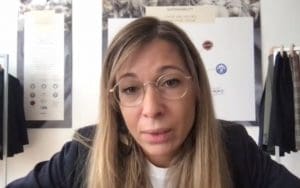
AUSTRALIAN wool growers were told to increase availability of fine certified non-mulesed wool to meet growing demand, on the second day of the virtual Wool Connect conference last week.
Heinz Zeller, the head of sustainability & logistics for the German luxury fashion house Hugo Boss said the company had achieved its targets for knitted products using non-mulesed wool over 20 micron.
But the company had struggled to in sourcing sufficient non-mulesed wool for products needing sub-19 micron wool.

Hugo Boss’ Heinz Zeller.
“It’s really not available and that’s why with Rebecca Picallo Gil (FOUR PAWS wool campaigner) we are in discussions with FOUR PAWS about signing the Brands Letter of Intent.
“Today, honestly there is not the availability on the market of non-mulesed wool for suits, jackets and fine trousers.”
Mr Zeller said he understood that non-mulesed wool would not help solve climate change issues.
But he said from a consumer demand perspective and for wool’s image, if the brand was to claim its product is responsible, mulesing is not compatible with this.
“So you can do everything, but if you have this (mulesing) in, you have a problem.
“We see the availability of the fine wool qualities is mainly coming from Australia, so here we really need the Australian farmers to do the next step, with all the good things they already do, there is no doubt on that.”
Marzotto’s use of certified wool is increasing

Marzotto’s Marta Federica Maniero
Marketing and communications manager with the Italian company Marzotto Wool Manufacturing Marta Federica Maniero said the wool textile industry has aspects that make it sustainable.
She said the certification is the wool industry’s best way to prove its sustainability credentials to consumers, but there was a lack of clear standards and poor communication of values along the supply chain. Certified sustainable raw material need to be differentiated and promoted over non-sustainable raw material, she told the conference.
Raising the issue of wool’s declining market share to polyster, Ms Maniero said certification is the solution.
“To evolve wool textile industry needs to demonstrate that it is sustainable and respectful of animal welfare and certification is probably the best solution that wool has in this moment.
“For now the only real solution to market needs is the use of certified product.”
Ms Maniero said there are several certification schemes and some are focussed on animal wellbeing and respect for the five freedoms. She said the UN also incorporate animal protection in its 2035 agenda for sustainable agenda.
Ms Maniero despite a contraction in manufacturing during the COVID-19 pandemic, Marzotto’s use of certified wool has increased.
“The purchase of certified wool has gone from 5 percent in 2019 to more than 24 percent in 2021 of all the wool purchased.”
She said the demand for certified products doubled from 2019 to 2020, “and it is 10 times more in 2021 compared to 2019.”
The company is now only considering purchasing wool and fabric made with certified raw material, she said.
Most clients’ requests have been for Responsible Wool Standard and Authentico certified products, she said. Some major clients are only requesting products made from certified wool for supply in 2026.
“So from today to 2025 in our wool buying campaign we mainly purchase wool material with certification that guarantees animal welfare.
“Just to be clearer, 2025 is tomorrow.”
Ms Maniero said wool growers must invest in certification and increase the availability of certified raw wool in the market.
“Certified wool should not be considered as premium product any more, but (as) a market standard.
“Today, there is still a shortage of certified wool.”
Ms Maniero said company research indicated that less than 20pc of the wool in the market is certified and the percentage drops to between 5-10 percent for wool up to 21.5 micron
Other manufacturers also said there was not enough certified wool to meet demand or to start new projects and participants were also told that processors were prepared to blend wool with polyster when insufficient certified wool was available.
Ms Maniero said companies like Marzotto must create more collections using certified raw material, promoting them to the customer, end user and supplier.

Certainly certifications are the future. Brands no longer require declarations like non-mulesed, but want certifications.
Unfortunately, many garment manufacturers make requests for certified products without even knowing what they are talking about.
Very often they ask for certified products, but do not think they are certified too — too complicated, too expensive, too limiting? And at this point the product for the consumer is no longer identifiable. Often the certification is used exclusively for advertising purposes.
Managing certifications for textile companies is complicated. Audit, management of warehouses divided by various brands of colour titles makes the warehouses grow considerably.
The fragmentation of certifications does not help – RWS, GOTS etc.
For companies upstream of the supply chain it is an increase in complexity and costs that are often not recognized downstream. The scarce availability of raw material certainly does not meet the needs of customers to be able to receive the finished product in a short time and they often opt for other types of wool, demonstrating the lack of consistency.
Two years ago, we visited Marzotto and we were staggered by the whole process of producing cloth, there own research and development to produce garments from this cloth and their passion for wool. While we were there we happened to have lunch with two representatives from a large wool trading and processing company and we discussed all sorts of wool matters, but they did make one comment that has stayed with us ever since. This quote was, that if we could, we would not buy one bale of wool out of Australia, because it’s just too hard to keep the two types of wool separate, ie non-mulesed wool versus mulesed wool. Until we can sell our customers certified wool on this matter we will never reach the true value of Australian wool.
Thank you Bruce Michael, for first of all visiting Marzotto, no doubt at your own expense, and then for faithfully reporting back to your fellow Australian wool growers the message from a key customer.
Bruce, not all growers have the opportunity you had, but collectively, we pay AWI a levy to do so on our account.
For some political reason, AWI fails to honestly convey the message that you have obviously heard and understood. Why cannot AWI?
Martin, you are extremely generous. Could you explain to your fellow growers how you justify your recommendation of 1 percent?
Whilst the message was clear from the Wool Connect conference last week that animal welfare including mulesing, together with environmental matters, are key issues now and will be in the future for the wool textile industry, there was not a word on this from the chairman of AWI, Jock Laurie, in last night’s webinar. Surely, someone must have asked questions on these topics?
Growers have come to expect, but it is not acceptable, for AWI to turn a ‘deaf ear’, to such matters, particularly when we hear reports that the same message is being conveyed to AWI from the Northern Hemisphere market by the Woolmark Company.
Why should growers financially support an outfit that distorts or ignores key messages from our customers? And there appears nothing growers can do about AWI, enjoying as it does political patronage.
I’m just trying to be being pragmatic Peter. Less is more with AWI, as we have witnessed during the past years with a reduced levy, less AWI spending and the price has gone up.
AWI is indeed a hand brake on the growth of the Australian wool industry. In the 20 years since it begun, wool production is down almost 50 percent.
I agree 100 percent Martin, as you say, AWI is a brake on the entire wool industry. Growers would be best served with a zero vote. If the Federal Government wants to fund yet another rort, then let them fund AWI 100pc and let the commercial industry get on, as it always has, in growing, processing and marketing wool. Innovation, as I have always argued, comes from commercial firms competing in the market place, not from rent-seekers sitting in an office in Sydney.
Constant reference to ‘certified wool’.
Certified as to what? Who certifies?
What does non-mulesed mean in this context? Who and how defined? Editor’s note: Certified wool in his context is non-mulesed wool, and not from sheep that have been freeze branded, and as certified by RWS, GOTS, SustainaWool or other integrity schemes.
Australian Wool Innovation’s new chairman Jock Laurie has highlighted the importance of supply chain transparency while declaring there was not “absolute clarity” in market feedback on mulesing and animal welfare.
Vote 1 percent at Woolpoll.
I would like to reply to the notion that, from the outside, too much of the Australian wool industry is delaying, arguing, picking holes in every detail, which just ends up confusing the customer and feeding mistrust and therefore too much trouble to pursue. Whether we like it or not, certification schemes will sell Merino wool….arguing about which one is right will not.
Transparency will give brands confidence, waiting for a magic number will not.
At the end of the day, brands like Hugo Boss, a huge champion of Merino wool, will want to sell quality products to their customer, and if Australia cannot supply what the market demand then they will just go elsewhere.
Well said Marianne McLean-Atkins, but you need to turn up the volume; we are all deaf at this end of the textile pipeline…well in Australia anyway.